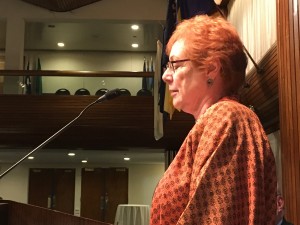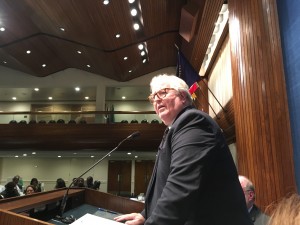2018 Distinguished Service Award presentation
at June 12 Dateline Awards and Hall of Fame Dinner
SPJ DC Pro Chapte r member Stephenie Overman, a past chapter president and currently co-chair of the Freelance Committee, introduced Distinguished Service Award honoree Gene Policinski at the June 12, 2018, Dateline Awards and Hall of Fame Dinner in the National Press Club Ballroom:
r member Stephenie Overman, a past chapter president and currently co-chair of the Freelance Committee, introduced Distinguished Service Award honoree Gene Policinski at the June 12, 2018, Dateline Awards and Hall of Fame Dinner in the National Press Club Ballroom:
“There are lots of reasons for the Society of Professional Journalists to honor Gene Policinski with our Distinguished Service Award.
“As you already know from the program, Gene is head of The Newseum Institute and its First Amendment Center.
“Oddly, what’s not mentioned is what I think of as one of Gene’s greatest achievements. He gave me my first paying job in journalism when he was editor of the Ball State Daily News. I remember the title: Copy flow supervisor. That meant that I ran the copy down the steps to the typesetters in the basement. Pasted up the newspaper, pulled the standing heds, 2-point rule stuck to our shoes.
“Yes, Gene has a long career as a professional journalist. He worked on newspapers in his/our native Indiana and was named Gannett News Service Indiana bureau chief in 1976.
“Gene moved to the Gannett News Service bureau in DC in 1979 and to the USA Today staff in early 1982, producing prototype editions. He was named USA Today’s first Washington Editor at age 31.
“A few years later, there was a book called “The Making of McPaper — The Inside Story of USA Today.” It has a number of stories about the intense pressure and tension of starting up the paper. I picked just one to share.
“According to ‘The Making of McPaper’ – ‘It was a few weeks before the A section enjoyed its first newsroom-wide laugh. Anne Saul was editing briefs for the Washington page when she discovered she didn’t have enough to fill the whole column. She called over to Gene Policinski “Your briefs are too short.” “It was like a window cracked,” Policinski says. “The entire room roared.”’
“Over the years Gene held a number of positions at USA Today, including managing editor of sports.
“In 1996, he began working at the Freedom Forum, the foundation that is the principal funder of the Newseum and Freedom Forum Institute.
“Today he writes, lectures and is often interviewed about First Amendment issues. He was host of ‘Newseum Radio,’ on National Public Radio Worldwide, and was executive producer of the Emmy Award-winning ‘Speaking Freely,’ which aired nationwide on public television for five seasons. He’s written his ‘Inside The First Amendment’ column — a ‘regular dose of First Amendment News’ — since 2004.
“Gene also has appeared on stage more than 150 times with Grammy Award-winning musicians in a live multimedia presentation ‘Freedom Sings.’ It’s a great show. (Are you going to sing a few bars?)
“For his long-time devotion to journalism and defense of the First Amendment, we’re proud to present the Society of Professional Journalists Distinguished Service Award to Gene Policinski.”
Gene Policinski, president and CEO, Newseum Institute and its First Amendment Center, delivering remarks June 12 in the National Press Club Ballroom upon being honored as the SPJ DC Pro Distinguished Service Award honoree for 2018
Gene Policinski remarks – SPJ – June 12, 2018
Good evening … let me begin by thanking SPJ DC Professional Chapter for this Distinguished Service Award … to Stephenie, thank you for that kind introduction. And congratulations to the inductees into the Hall of Fame, and the Dateline finalists and winners as well.
A group from the Newseum, Freedom Forum and Freedom Forum Institute are here with us tonight … the contingent is led by Freedom Forum Chair Jan Neuharth. … I could not be more proud to have such talented and inspiring colleagues in the effort to explain, protect and advance the cause of a free press and our First Amendment freedoms.
Thank you all.
Finally, with me tonight for such a signature moment in my professional My wife Kathleen Powell and our oldest son Ryan, from Indianapolis. Our younger son David, who lives in Nashville, is here in spirit – he just started a new job and I encouraged him to keep it!
Starting with that mix of the professional and personal is very appropriate for my thoughts tonight … for me, as I approach next year to mark my 50th year in professional journalism – the idea of a free and independent press as essential to my life and well as my life’s work – the linking has always seemed natural to me.
Contrary to the views held a few blocks from here … and, it would seem, by some percentage of our fellow citizens … journalists and journalism have always been by the people and for the people … not an industry apart, but a profession in which a few represent the rest of us …. Going to work each day to ask those questions we all would ask of our leaders, and of those who otherwise impact our lives … reporting back to the rest of us, so that we all may take that information and make decisions from the most mundane to the most important, about our lives.
I look with puzzlement on those who accept the politically or socially expedient argument that journalists as a group are elitist, self-absorbed and out of touch. I suppose such folks do exist within journalism … but I would think at no more a percentage than any other profession, if not less because our very work forces us to look and report beyond just ourselves, our families or our circle of friends and associates.
We’ve always been lousy storytellers when it comes to our own work … be that the successes we’ve celebrated among ourselves (there’s no Pulitzer TV extravaganza) or the errors that until all too recently we failed to properly acknowledge publicly.
But these times call for journalists to become as adept at telling the public what we do, and why it matters, as we are good at telling everyone else’s story. To fail to do so invites that common sense observation that if we don’t tell our own story, someone else will … and to some extent, they are.
Enemies of the people? Impossible … In every city and town, anywhere a print, broadcast or online journalists works, journalists are the people … their eyes and ears, their voice and – as the First Amendment provides – the public’s muscle that’s required to keep government in check and focused on the public’s priorities.
Out of touch? … Any number of factors can challenge or shape how well journalists on a given day or over a given period of time stay in touch with the people on whom they report … for example, in today’s economically challenged media landscape, news reports may suffer simply because of a lack of people who can keep in touch.
But for a profession that thrives on the literal reporting of thousands of facts each day about events touching millions of lives … it is impossible to be as remote as critics today may have it.
Horrible people? Threats to Democracy? Absolutely not. Most journalists are motivated by the simple desire to tell others the news … and to do so truthfully, fairly, quickly and in as clear a manner as possible. The idea of a news media cabal that somehow conspires on a daily basis to misinform can only be advanced by the ignorant few who lack any understanding of how news reports are assembled – and who most likely have never met a journalist, sometime out of the fear of disrupting their preconceived notion of journalist as villain.
As all of us in this room know, daily journalism more closely resembles a controlled train wreck than a carefully executed conspiracy!
If we can get the public to focus on the reality of journalism for a moment, they will see news reports that run the gamut from today’s school lunch menu to next month’s water bill increase to health issues to the very safety of our nation … reported from different vantage points, perhaps, but with a collective voice that – with rare exceptions – has proven accurate, fair and thorough through the years.
Let me close by acknowledging that technology has disrupted the lucrative financial model for most news outlets that existed for about a century, one based on advertising and circulation income. … That this disruption has cost journalism not just tens of thousands of jobs over the last 20 years, but often also the veterans who would – in earlier times – be around to mentor a succeeding generation.
But there are also the hopeful signs that the wave of disruption has run its course … new media and new journalistic means of reporting, storytelling and of holding government accountable, are also emerging… along with a new generation of journalist as familiar with telling a story in images, data and voices as in any one of those mediums.
And more than that, we see emerging from the confusing early years of the internet, a demand from readers, viewers, listeners and users not just for information told in a new way, but in a manner that adapts to the devices they use to receive it … and but a renewed focus on information they can trust.
In a world in which a deluge of information on virtually any topic is available on demand, the real demand is for information that is credible; information on which life’s decisions can be made with as much precision and accuracy as possible.
In First Amendment terms, that’s the founders’ vision for a free press – and why they so strongly protected it. They knew that as a self-governing people, we need information — best gathered by independent sources that know us best – in order to make the crucial decisions that work best, in the shortest amount of time, in the most efficient manner, for the greatest number of people.
I am humbled to be in the presence of people who work or have worked in that noble profession. I challenge those here, and throughout the nation, to take the message of how that professional really works to those temporarily distracted by the political sideshow that sees momentary political gain in rhetoric that demeans journalism.
And most importantly, I ask journalists to recommit themselves to keeping – and in some cases, reclaiming – the public trust through reporting the news in a fair, accurate, complete manner. In doing that, we will protect a free press and our democracy.
